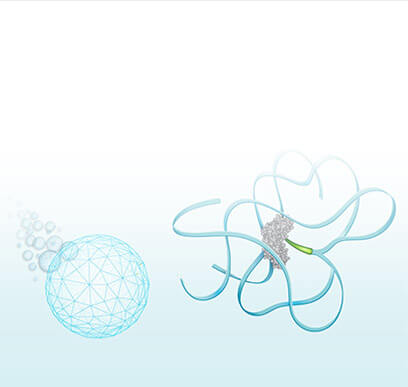TransCon CNP
Designed for continuous CNP exposure to rebalance bone growth in skeletal disorders
Designed for continuous CNP exposure to rebalance bone growth in skeletal disorders
C-type natriuretic peptide (CNP) is a naturally occurring peptide that regulates bone growth. It has shown promise as a therapeutic target for treating growth disorders and skeletal disorders such as skeletal dysplasia.
Achondroplasia (ACH) is the most common form of skeletal dysplasia, caused by a genetic mutation in the fibroblast growth factor receptor 3 (FGFR3). This leads to an imbalance between the stimulatory and inhibitory signaling pathways involved in regulating bone growth.
People living with ACH may experience serious complications and comorbidities due to inhibited skeletal development. Complications may include sleep apnea and respiratory problems, chronic back and leg pain from lower spine impingement, and sudden infant death from compression of the brain stem. Chronic ear infections due to eustachian tube problems can lead to hearing loss and speech delay. Children with ACH may also experience social and emotional challenges.
CNP has been shown to counteract the growth-inhibiting effects of the FGFR3 mutation and stimulate growth. Increasing CNP levels to modulate excessive FGFR3 signaling and rebalance the pathways that regulate growth may reduce the complications and comorbidities of ACH.
Yet CNP has a very short half-life. When administered as a therapeutic, it does not remain in the body long enough to exert an effect without assistance. This has prevented it from being effectively developed as a treatment. We believe prolonged exposure of CNP maximizes its potential as a therapeutic to address the medical complications related to ACH.
TransCon™ technology offers a potential solution to achieve this goal.
TransCon CNP
TransCon CNP is an investigational prodrug of CNP in development for the treatment of ACH in children. Designed to provide continuous CNP exposure, the goal of TransCon CNP is to optimize efficacy with a safe and convenient once-weekly dose. TransCon CNP has orphan designation for the treatment of ACH in both the U.S and Europe.
A new frontier of growth
With the possibility of a sustained release profile and continuous exposure enabled by our TransCon technology, we are opening up new frontiers to investigate CNP in our future research.





